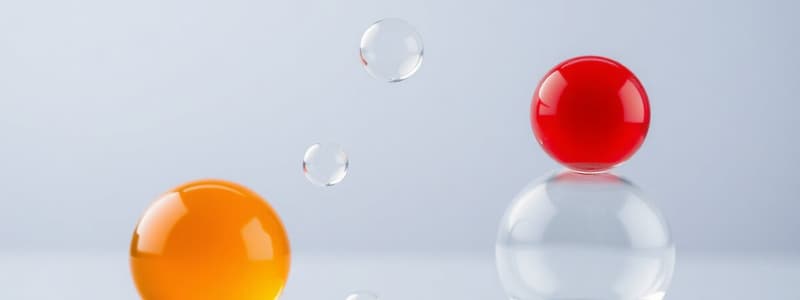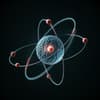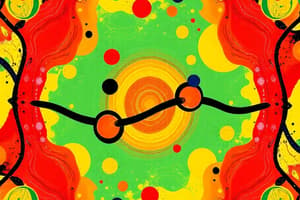Podcast
Questions and Answers
What happens to sodium (Na) in the formation of sodium chloride (NaCl)?
What happens to sodium (Na) in the formation of sodium chloride (NaCl)?
- Sodium gains an electron to become Na⁻.
- Sodium loses one electron to become Na⁺. (correct)
- Sodium shares its electrons with chlorine.
- Sodium becomes a neutral atom.
Which property is NOT characteristic of ionic compounds?
Which property is NOT characteristic of ionic compounds?
- Conductivity when dissolved in water
- High melting and boiling points
- Solubility in water
- Electrical conductivity in solid state (correct)
What occurs when ionic compounds dissolve in water?
What occurs when ionic compounds dissolve in water?
- They become less soluble.
- They form a solid precipitate.
- They form neutral molecules.
- The ions separate and disperse. (correct)
Why do ionic compounds have high melting and boiling points?
Why do ionic compounds have high melting and boiling points?
When can ionic compounds conduct electricity?
When can ionic compounds conduct electricity?
What does a molecular formula represent?
What does a molecular formula represent?
Which of the following is the empirical formula for glucose?
Which of the following is the empirical formula for glucose?
In which scenario would knowledge of molecular formulas be particularly useful?
In which scenario would knowledge of molecular formulas be particularly useful?
How can the molecular formula be derived from an empirical formula?
How can the molecular formula be derived from an empirical formula?
What is represented in a chemical formula?
What is represented in a chemical formula?
What does an empirical formula NOT provide?
What does an empirical formula NOT provide?
What is the empirical formula mass for CH₂O?
What is the empirical formula mass for CH₂O?
Which aspect of molecular formulas is particularly useful in biology?
Which aspect of molecular formulas is particularly useful in biology?
What is the molecular formula of glucose?
What is the molecular formula of glucose?
How is the empirical formula determined from percentage composition?
How is the empirical formula determined from percentage composition?
Which statements best describe the difference between molecular and empirical formulas?
Which statements best describe the difference between molecular and empirical formulas?
In cellular respiration, glucose is broken down into which compounds?
In cellular respiration, glucose is broken down into which compounds?
What is a primary use of empirical formulas in biology?
What is a primary use of empirical formulas in biology?
What is one challenge of using molecular formulas in research?
What is one challenge of using molecular formulas in research?
Which of the following is NOT a role of molecular formulas in biology?
Which of the following is NOT a role of molecular formulas in biology?
What is the simplest empirical formula for a compound with 40% carbon, 6.7% hydrogen, and 53.3% oxygen?
What is the simplest empirical formula for a compound with 40% carbon, 6.7% hydrogen, and 53.3% oxygen?
In drug design, why is knowing the molecular formula important?
In drug design, why is knowing the molecular formula important?
Which of the following accurately describes molecular formulas in relation to empirical formulas?
Which of the following accurately describes molecular formulas in relation to empirical formulas?
What is the primary reason biological molecules are challenging to analyze?
What is the primary reason biological molecules are challenging to analyze?
What defines isomers in chemistry?
What defines isomers in chemistry?
What can lead to incorrect empirical formulas?
What can lead to incorrect empirical formulas?
How are cations formed?
How are cations formed?
What distinguishes anions from cations?
What distinguishes anions from cations?
Which best describes the octet rule?
Which best describes the octet rule?
What occurs when cations and anions interact?
What occurs when cations and anions interact?
Which atoms typically form cations?
Which atoms typically form cations?
Which of the following is a common example of an anion-forming element?
Which of the following is a common example of an anion-forming element?
What is a characteristic of ionic bonds?
What is a characteristic of ionic bonds?
Flashcards are hidden until you start studying
Study Notes
Introduction to Cations and Anions
- Cations are positively charged ions formed when an atom or molecule loses electrons.
- Anions are negatively charged ions formed when an atom or molecule gains electrons.
- Cations and anions play vital roles in chemical reactions and biological processes.
Formation of Cations and Anions
- An atom is electrically neutral when it has an equal number of protons and electrons.
- Cations form when an atom loses electrons, resulting in a net positive charge.
- Anions form when an atom gains electrons, resulting in a net negative charge.
- The formation of cations and anions can occur through various means, such as chemical reactions, exposure to radiation, or the application of an electrical current.
The Role of the Octet Rule in Ion Formation
- The octet rule helps explain the formation of cations and anions.
- Atoms tend to gain, lose, or share electrons to achieve a full outer electron shell, typically containing eight electrons.
- Atoms with fewer than four electrons in their outer shell tend to lose electrons to achieve a full outer shell (forming cations).
- Atoms with more than four electrons in their outer shell tend to gain electrons to fill the shell (forming anions).
Ionic Bonds
- Ionic bonds form between cations and anions due to electrostatic forces of attraction.
- Ionic bonds are typically formed between metals (which tend to lose electrons) and non-metals (which tend to gain electrons).
- The result is the formation of an ionic compound held together by ionic bonds.
Properties of Ionic Compounds
- Ionic compounds typically have high melting and boiling points due to the strong electrostatic attraction between ions.
- They are usually soluble in water, where the ions separate and disperse throughout the solution, making it conductive.
- Ionic compounds do not conduct electricity in their solid state because the ions are locked in place within the crystal lattice. However, when dissolved in water or melted, the ions are free to move, enabling electrical conductivity.
Studying That Suits You
Use AI to generate personalized quizzes and flashcards to suit your learning preferences.





